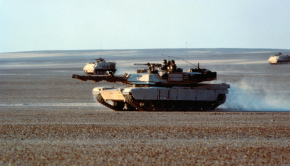 President Barack Obama out-maneuvered former Massachusetts Gov. Mitt Romney in their third and final public debate Oct. 22 at Lynn University in Boca Raton, FL. The main topic was foreign policy.
President Barack Obama out-maneuvered former Massachusetts Gov. Mitt Romney in their third and final public debate Oct. 22 at Lynn University in Boca Raton, FL. The main topic was foreign policy.But the Commander-in-Chief had to go the full distance to win the bout. He threw no haymakers during the 90-minute contest but he did land more punches and scored more points than his opponent.
The win gives Obama a 2 to 1 debate victory margin over Romney. Some say it should be 3 to 1, counting Vice President Joe Biden's win over vice presidential candidate Paul Ryan earlier in the month.
Romney missed several chances to score soundly. One came right at the opening bell. Moderator Bob Schieffer of CBS News asked both candidates for their views on the mortar shell attacks in September on a U.S. Consulate building in Benghazi, Libya.
Many Americans view that episode as a great embarrassment to the Obama Administration. The White House prides itself on being one or two steps ahead of Al Quada's terrorists in the Middle East. But Romney didn't pick up on that angle. Instead, he ran down a laundry list of political, economic and military problems facing the U.S. in the Middle East.
Neither debater provided forceful answers on Syria, Cuba, China, Iran and Iraq. Both speakers, time and again, veered back to economic issues in the U.S., a topic with which most voters are concerned. American voters care little about foreign policy. They care foremost about jobs - their own, especially.
As in the two previous debates, both speakers strayed from the truth at times. Romney goofed especially when he suddenly brought up the current strength of the U.S. Navy. He said the fleet at 285 vessels is at its lower number since 1917.
False. The actual low was in 2007 when the ship total stood at 278, according to a U.S. Navy website.
Obama countered Romney's ship total assertion by telling him the total number of warships today can't be compared to their size of 20 or 40 years ago.
"You mentioned the Navy, for example, and that we have fewer ships than we did in 1916," Obama quipped. "Well, Governor, we also have fewer horses and bayonets, because the nature of our military's changed."
Romney didn't respond to that zinger, either. But the President was wrong on the bayonet note. U.S. Marines still use bayonets on certain arms.
The knives, which fit on the end of a rifle barrel and have been around since the 17th century, are not just there for when the ammo runs out and the enemy is close. According to the U.S. Army, the M9 bayonet serves as "a hand weapon, as a general field and utility knife, as well as a wire cutter together with its scabbard, and as a saw."
On Syria, Obama again repeated that Syria President Bashar Assad's "days are numbered." Not entirely accurate at this time because Assad has been in power for a full year now, killing 30,000 of his own people.
On Iran, Romney stated that country is "four years closer" to manufacturing a nuclear weapon. Again not entirely correct.
For example, if Iran were to produce highly enriched uranium (HEU) for a weapon, United Nation inspectors and monitoring devices would immediately detect the move. The U.S. and its allies would quickly respond with an air strike, most experts today agree.
So how will the three debates affect the Nov. 6 election?
Unknown exactly at this point. But what is clear and sometimes puzzling to most American and international voters is that the individual popular vote count isn't always a signal of who won the election. It's a device called the Electoral College that is the supreme decision maker.
Already four million ballots have been cast in early voting in more than two dozen states.
Barring a last-minute change in strategy by one campaign or the other, Obama appears on course to win states and the District of Columbia that account for 237 of the 270 electoral votes needed for victory. The same is true for Romney in states with 191 electoral votes.
The battlegrounds account for the remaining 110 electoral votes: Florida (29), North Carolina (15), Virginia (13), New Hampshire (4), Iowa (6), Colorado (9), Nevada (6), Ohio (18) and Wisconsin (10).
What does this mean in practice?
As David Walbert, former Editorial and Web Director of LEARN NC until 2011 at the University of North Carolina at Chapel Hill, NC, explains, there is no national election in the United States for president; only separate state elections
For a candidate to become president, he or she must win enough state elections to garner a majority of electoral votes. Presidential campaigns, therefore, focus on winning states, not on winning a national majority.
Romney has tried to win the presidency for the last six years. The polls claim the two men are tied at 50 percent each in voters' preferences.
Eleven days are left before the Nov. 6 final voting begins. Will Romney make it this time? Or will Obama be given another chance to try and turn the country around over the next four years? Stay tuned. It could turn out to be a cliff-hanger.

 By
By 